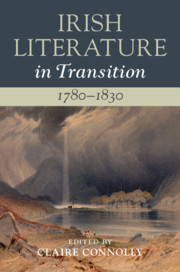Book contents
- Irish Literature in Transition, 1780–1830
- Irish Literature in Transition
- Irish Literature in Transition, 1780–1830
- Copyright page
- Contents
- Contributors
- Series Preface
- General Acknowledgements
- Acknowledgements
- Introduction
- Part I Origins
- Part II Transitions
- Part III Reputations
- Chapter 8 Placing Mary Tighe in Irish Literary History: From Manuscript Culture to Print
- Chapter 9 Edgeworth and Realism
- Chapter 10 Lady Morgan and ‘the babbling page of history’: Cultural Transition as Performance in the Irish National Tale
- Chapter 11 ‘The diabolical eloquence of horror’: Maturin’s Wanderings
- Chapter 12 English Ireland/Irish Ireland: the Poetry and Translations of J. J. Callanan
- Chapter 13 Thomas Moore and the Social Life of Forms
- Chapter 14 ‘English, Irished’: Union and Violence in the Fiction of John and Michael Banim
- Chapter 15 The Transition of Reputation: Gerald Griffin
- Chapter 16 William Maginn: the Cork Correspondent
- Part IV Futures
- Index
Chapter 10 - Lady Morgan and ‘the babbling page of history’: Cultural Transition as Performance in the Irish National Tale
from Part III - Reputations
Published online by Cambridge University Press: 28 February 2020
- Irish Literature in Transition, 1780–1830
- Irish Literature in Transition
- Irish Literature in Transition, 1780–1830
- Copyright page
- Contents
- Contributors
- Series Preface
- General Acknowledgements
- Acknowledgements
- Introduction
- Part I Origins
- Part II Transitions
- Part III Reputations
- Chapter 8 Placing Mary Tighe in Irish Literary History: From Manuscript Culture to Print
- Chapter 9 Edgeworth and Realism
- Chapter 10 Lady Morgan and ‘the babbling page of history’: Cultural Transition as Performance in the Irish National Tale
- Chapter 11 ‘The diabolical eloquence of horror’: Maturin’s Wanderings
- Chapter 12 English Ireland/Irish Ireland: the Poetry and Translations of J. J. Callanan
- Chapter 13 Thomas Moore and the Social Life of Forms
- Chapter 14 ‘English, Irished’: Union and Violence in the Fiction of John and Michael Banim
- Chapter 15 The Transition of Reputation: Gerald Griffin
- Chapter 16 William Maginn: the Cork Correspondent
- Part IV Futures
- Index
Summary
Lady Morgan’s celebrity has come to be defined by her aptitude for self-fashioning, as she embodied her fictional heroine Glorvina for an enraptured English readership. Morgan’s self-conscious representation of herself in her Memoirs (1862) as ‘the poor butt that reviewers, editors and critics have set up’ suggests an equally acute awareness of her literary reception and legacy. Taking these notions of literary celebrity and self-fashioning as its starting point, this chapter focuses on Morgan’s national tales, arguing that her writing provides a self-conscious account of the cultural circulation of Irish identity. Morgan’s layering of multiple genres and discourses in her national tales indicates a writer deeply engaged with processes of both cultural and literary transition and the chapter suggests that this engagement is best understood through Morgan’s fictional appraisal of Enlightenment philosophical constructions of history and nation. In their alertness to the politics of sympathy and the performance of national suffering, the novels construct Ireland as a site of multiple and competing modes of perception and representation. In doing so, they reveal Morgan as a self-conscious reviser of form who both registers and shapes the dynamic literary transitions taking place during the romantic period.
Keywords
- Type
- Chapter
- Information
- Irish Literature in Transition, 1780–1830 , pp. 206 - 225Publisher: Cambridge University PressPrint publication year: 2020

